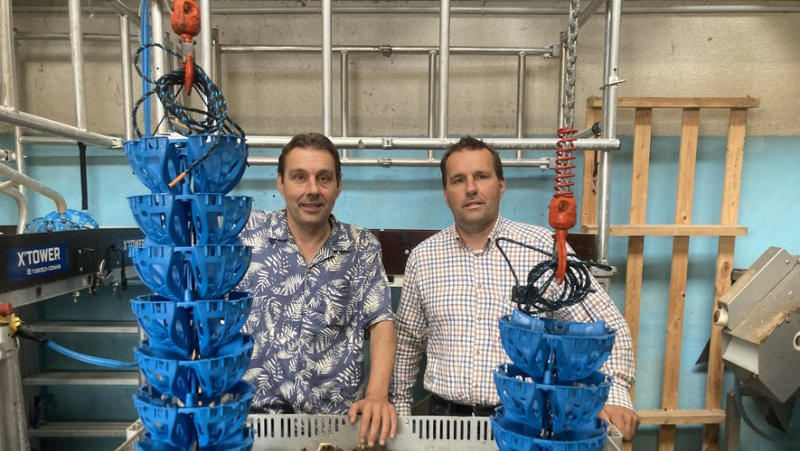“Oyster farmers and inventors”: on the Etang de Thau, the Cambon brothers present their eco-case

Philippe et Christian Cambon devant une colonne d’éco-écrins. Midi Libre – Thomas Ancona-Léger
Avec leur éco-écrin, les deux ostréicultures espèrent proposer une alternative à l’huître collée qui pourrait bien faire évoluer la profession.
Above all, don’t go and tell them that it’s a revolution: the Cambon brothers, oyster farmers between Mèze and Bouzigues, have a horror of this notion. However, their latest invention, which has just been awarded first prize in the Flex in Blue challenge organized by the economic attractiveness agency Blue, could well change the face of the profession. The concept ? The eco-case, plastic baskets that can be clipped together and in which the spat are placed which then develop, sheltered from predators and bad weather.
An alternative to glued oysters
"The’eco-case is an alternative to the glued oyster which generates a lot of multifactorial losses and generates waste" ;, attacks Philippe Cambon from his office located above his shellfish farm La Perle de Thau."Thanks to this system, we no longer have to use cement to glue the oyster to the rope and then peel it off, this is a major time saving, a great simplification and it’is more ecological." In their research, Christian and Philippe Cambon declare that they were only guided by a choice : "Seek a unique solution to all the problems that the profession may encounter".
Intermarché prototype
The idea germinated in the minds of the two brothers in 2010, after having diagnosed all the disadvantages of contemporary shellfish farming techniques. They then imagined the first eco-box, which they created at the time with plastic plates and cutlery purchased at the supermarket. "We called it the Intermarché prototype because we bought everything there", explains Christian Cambon. There followed a long period of making contacts which resulted in 2017, thanks to the support of the Pôle Mer, in obtaining financial support (FUI and FEDER) from an amount of two million euros.
In association with the Paris School of Arts and Crafts
In the meantime, the two brothers joined forces with the Paris School of Arts and Crafts (ENSAM). The famous Parisian school carries out studies on currentology and the aging of materials while ensuring that microplastics do not migrate towards the flesh of the oyster. This allows you to choose the most suitable material. "A plastic which has a minimum lifespan of ten years, which does not float and which is entirely recyclable, assures Philippe Cambon. Nested one on top of the other on the rope, the eco-cases make up a line light enough to lift it on a pulley, but heavy enough not to drift or float. And mobile enough to change a case, harvest the oysters and be able to reseed them straight away."
Towards commercialization
Today, the Perle de Thau claims to be a "pilot company" in this matter. "We are still in a hybrid period but this is the tipping point", explains the oyster farmer in front of a column of ;rsquo;eco-cases attached to a hook. "Ultimately, we would like to offer it for marketing", he adds. An achievement for these two brothers who define themselves as oyster farmers and inventors.
I subscribe to read more




